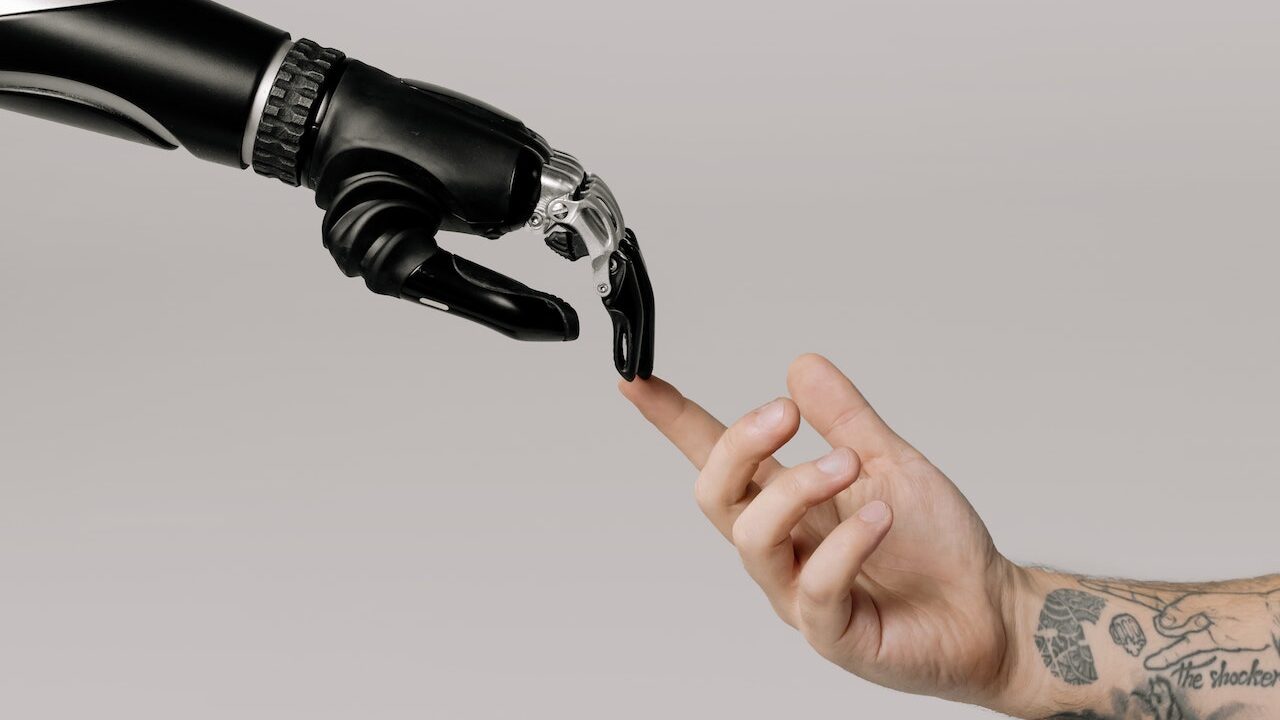AI’s Impact: The Game Changer
Artificial Intelligence. It’s a term that’s permeated our daily lives, from Siri in your iPhones to reels on your TikTok and Instagram flooded with AI topics such as – “10 best ChatGPT prompts to improve your business” could transform your life. Yet, despite its omnipresence, the understanding of AI remains limited. Sanctity AI aims to bridge that knowledge gap, ensuring AI’s utility is maximized while its risks are understood and mitigated. Today, let’s dive deeper into the limitations of AI.
The Double-Edged Sword of AI
AI has proven to be a versatile tool. It can predict stock market trends, recommend songs based on your music taste, or even diagnose medical conditions with impressive accuracy. But what happens when AI fails? Consider the self-driving Uber car that struck and killed a pedestrian in Arizona in 2018. The sanctity of human life was compromised because we over-trusted the machine.
Table 1: High-Impact Areas of AI
| Sector | Benefit of AI | Risk of AI |
|---|---|---|
| Healthcare | Early diagnosis | Misdiagnosis |
| Finance | Fraud detection | Market crash |
| Transportation | Safety | Accidents |
| Retail | Personalization | Data breach |
The stakes are high, and understanding the boundaries of AI is essential for responsible use.
Deciphering AI: Can Do’s vs. Can’t Do’s
Imagine a chess grandmaster. Meticulous, precise, unbeatable. That’s your AI when it comes to data analytics or pattern recognition. Now, imagine asking this chess grandmaster to write a poem. The result? A disjointed string of words that lacks soul. That’s the limitation.
AI is Not Creative

AI is brilliant at handling data and making predictions based on it. But when it comes to creativity or moral judgment, it falls flat. An AI can generate a piece of art using algorithms, but it can’t feel the emotion behind it.
Table 2: Capabilities and Limitations of AI
| Capabilities | Limitations | Uncertainties |
|---|---|---|
| Data Analytics | Moral Judgement | Emotional Quotient |
| Predictions | Original Creativity | Common Sense |
| Automation | Emotional Understanding | Ethical Boundaries |
The AI Algorithm Conundrum
Ever wonder why you get recommended certain YouTube videos? The algorithm is designed to keep you engaged, not necessarily enlightened. They serve you more of what you watch, creating a feedback loop. This system lacks the sanctity of intellectual growth and instead aims for maximized screen time or was it programmed in a way that maximizes screen time? It’s crucial to understand the limitations of AI.
What does all this mean for the sanctity and responsible use of AI in our daily lives?
Real-world Case Studies
Case Study 1: IBM Watson in Healthcare

IBM’s Watson is a prime example of AI’s transformative power. Initially designed to answer questions on the quiz show Jeopardy!, Watson has expanded its horizons into the medical field. By sifting through massive amounts of medical literature, the AI helps physicians make informed decisions. Watson’s AI-based recommendations have, in many instances, led to early diagnosis and effective treatment plans.
However, Watson also had its share of controversy. In 2018, it was reported that the AI gave ‘unsafe and incorrect’ medical advice during its pilot programs. This glaring error puts the sanctity of human health at risk.
Case Study 2: Facial Recognition in Law Enforcement
Facial recognition technology has been a boon for law enforcement agencies, aiding in the quick identification and capture of criminals. However, this same technology has led to numerous false arrests and racially biased outcomes, thereby compromising the sanctity of justice.
Table 3: Real-world AI Case Studies
| Case Study | Benefits | Risks |
|---|---|---|
| IBM Watson | Early Diagnosis | Wrong advice |
| Facial Recognition | Quick Identification | Racial bias |
The AI Decision Matrix
When it comes to AI, it’s all about striking a balance. You don’t have to reject or blindly accept the machine’s output. It’s about knowing when to defer and when to take control. To aid you in this decision-making process, we’ve developed an AI Decision Matrix.
Table 4: AI Decision Matrix
| Situation | Trust AI | Doubt AI |
|---|---|---|
| Low Stakes | ✔️ | ✖️ |
| High Stakes | ✖️ | ✔️ |
| Clear Data | ✔️ | ✖️ |
| Ambiguous Data | ✖️ | ✔️ |
If you’re dealing with low-stakes, routine tasks, and clear data, it’s generally safe to trust AI. However, in high-stakes situations or those involving ambiguous data, human intervention becomes essential to maintain the sanctity of the outcome. We want to emphasize that the measure of stakes and the definition of clear data are quite subjective and hard to quantify and consider the various limitations of AI.
Common Misconceptions About AI
AI is Infallible

The notion that AI is infallible is perhaps the most hazardous misconception. No system is perfect; every tool has its limitations. The sooner we recognize this, the safer we’ll be. Remember, even the best AI systems like Watson have made significant mistakes.
AI Can Think Like Humans
The term “Artificial Intelligence” might imply that these systems can think and reason like humans. However, that’s far from the truth. AI doesn’t have a sense of self or consciousness. It operates based on algorithms and data, lacking the ability to question its own existence or understand the sanctity of life.
In a world increasingly driven by algorithms, how do we ensure that we’re not becoming mere data points in a machine’s learning curve?
When to Seize Control
It’s not about AI replacing humans; it’s about AI augmenting human capabilities. Knowing when to take the reins back is vital. So, how do you decide?
AI in Healthcare: A Cautionary Tale
In healthcare, the cost of an incorrect decision can be a human life. Even though AI like Watson has shown promise in diagnostics, the choice of a treatment plan should always be made by a medical professional who understands the patient’s unique health conditions and potential drug interactions. There’s no room for mistakes; the sanctity of human life is at stake.
Autonomous Vehicles: Not Fully Autonomous Yet

With companies like Tesla pushing the envelope on self-driving technology, it’s easy to become complacent and leave it all to the machine. However, current tech still requires human oversight. Until technology reaches a point where it can handle every possible scenario, it’s crucial that drivers remain engaged.
Table 5: When to Take Control
| Scenario | AI Competence | Human Oversight Needed |
|---|---|---|
| Medical Decision | High but limited | Always |
| Driving | Moderate | Always |
Addressing FAQs
After this, we’ll tackle frequently asked questions that come up in this context. Questions like “Is AI going to take over my job?” or “Is it safe to use AI in sensitive sectors?” will be thoroughly addressed to provide you a comprehensive view.
The Sanctity of Decision-making
Decision-making isn’t just about solving a problem; it’s about understanding the ethical and emotional layers that machines can’t perceive. It’s about recognizing that sometimes the right decision can’t be made by analyzing data alone. In those instances, we must step in to uphold the sanctity of the human decision-making process. The machine is a tool, not a replacement.
When does the line between a useful tool and a potential risk become blurred? And how do you maintain the sanctity of your choices in a world increasingly dependent on automated decisions?
The Ethical Dimension of AI

Let’s dive into the ethical waters. Ethical considerations are not a mere afterthought; they’re integral to understanding the scope and limitations of AI.
Accountability
Who’s responsible if an AI system makes a mistake? Is it the developer, the user, or the AI itself? These questions don’t have straightforward answers, but one thing is clear: we need to establish a framework for accountability to preserve the sanctity of ethical conduct.
Transparency
AI algorithms often operate as “black boxes,” making it challenging to understand their decision-making processes. Transparent algorithms are not just an academic interest; they’re a necessity. People have a right to know how decisions affecting them are made, emphasizing the sanctity of individual rights.
Inclusivity
Bias in AI models can result in unfair, and at times, damaging decisions. By making sure that AI systems are trained on diverse data sets, we can attempt to make them as inclusive as possible.
Table 6: Ethical Considerations in AI
| Ethical Aspect | Importance | Challenges |
|---|---|---|
| Accountability | High | Legal framework |
| Transparency | High | Technical barriers |
| Inclusivity | High | Data bias |
Conclusion: Navigating the AI Landscape
AI is an extraordinary tool. It has the power to revolutionize every aspect of our lives. However, like any tool, it’s not without its drawbacks. As we continue to integrate AI into our daily lives, it’s vital to approach it with both enthusiasm and caution. AI can be an excellent servant but a terrible master. Understanding when to let AI take the wheel and when to seize control is not just smart; it’s necessary for the sanctity of our future.
The Importance of the Sanctity of AI

Understanding the potential and limitations of AI isn’t merely an intellectual exercise; it’s a societal imperative. AI has to be used responsibly to ensure that we are enhancing human life, not endangering it. The sanctity of AI is not just about the technology itself, but about how we, as a society, choose to use it.
In this age of digital transformation, are we adequately considering the sanctity of human intellect, emotion, and ethical considerations?
Addressing FAQs – Part 1
In our journey through the complexities and responsibilities of AI, several questions naturally arise. Let’s address some of the most frequently asked questions related to AI’s potential and limitations.
Can AI Replace Human Jobs?
AI is designed to automate repetitive tasks, but it’s far from replacing human creativity, emotional intelligence, and decision-making capabilities. While AI may make some jobs obsolete, it will create new roles that we can’t even imagine yet.
How Safe is AI in Healthcare?
The technology itself holds immense potential for diagnostics and treatment planning. However, the final decision should always rest with a medical professional. The sanctity of human life is too critical to be left entirely to algorithms.
Can AI Systems be Biased?
Absolutely. AI systems are trained on data generated by humans, and humans are inherently biased. The key is to recognize this limitation and work actively to mitigate these biases.
Is AI Transparent Enough for Legal Matters?
Currently, the answer is no. The so-called “black box” nature of many AI algorithms makes it difficult to understand how specific decisions are reached, challenging the sanctity of the legal process.
How Do I Know if I Can Trust an AI System?
Trust should be earned, not assumed. Always consider the source of the AI, how the system was trained, and whether it has been audited for bias and errors. Your decision to trust should be based on evidence, not blind faith.
Can AI be Used in Critical Safety Systems?
With the current state of technology, AI can be a part of safety systems but should not be solely responsible for critical decisions. Human oversight is necessary to maintain the sanctity of safety and overcome the limitations of AI.
Do AI Systems Have Rights?
As of now, AI doesn’t have consciousness, emotions, or self-awareness, so the concept of “rights” doesn’t apply to them. It’s crucial to remember that machines are tools, not sentient beings.
What are the Ethical Implications of AI?
The ethical landscape surrounding AI is complex. Issues of accountability, transparency, and inclusivity are still in the realm of ongoing debate and legislation. Limitations of AI, with its ethical implications need to take precedence over harnessing the potential of AI.
Are we prepared for a future where AI plays an increasingly important role in decision-making, and how does that impact the sanctity of human choice?
Can AI Develop Emotions?
Current AI models can simulate emotional responses based on data, but this is not the same as experiencing emotions. The sanctity of human emotions remains unparalleled.
How Far Are We From General AI?
Despite significant advancements, we’re still far from developing General AI that can perform any intellectual task a human can do. For now, AI excels in specific tasks only.
How Does AI Impact Environmental Sustainability?
AI can both help and harm the environment. While it can optimize resource use and reduce waste, the data centers that power AI consume massive amounts of energy, challenging the sanctity of environmental sustainability.
How to Ensure Data Privacy With AI?
Ensuring data privacy is a shared responsibility between the developers and the users. Using encryption and compliance with regulations like GDPR can help maintain the sanctity of user data.
How Can AI Benefit Small Businesses?
AI can automate mundane tasks, analyze data for insights, and improve customer interactions, leveling the playing field for small businesses.
Can AI Amplify Human Biases?
Yes, if not trained and audited correctly, AI can replicate and even exacerbate existing human biases, challenging the sanctity of fair decision-making.
Can AI Surpass Human Intelligence?
AI can surpass human performance in specific tasks, but it lacks the creativity, emotional intelligence, and adaptability that humans possess.
How Does AI Affect Mental Health?
AI can assist in mental health diagnoses and treatment suggestions, but it’s not a substitute for human empathy and understanding, emphasizing the sanctity of mental well-being.
Can AI be Ethical?
Ethical AI is not about the machine’s morals but about the ethical frameworks humans put in place for their development and deployment.
Can AI be Used for Social Good?
Absolutely. From healthcare to combating climate change, AI holds the promise of amplifying our ability to do good, provided we maintain the sanctity of its responsible use.
How Can I Get Started With AI?
Start small. There are numerous online courses and tools available for beginners. As you learn, you can take on more complex projects.
What is the Future of AI?
The future is promising but laden with challenges that require responsible handling to maintain the sanctity of human-AI interaction.
Do we understand the weight of the decisions we’re delegating to AI, and are we cautious enough to mitigate the risks involved? Comment below!



